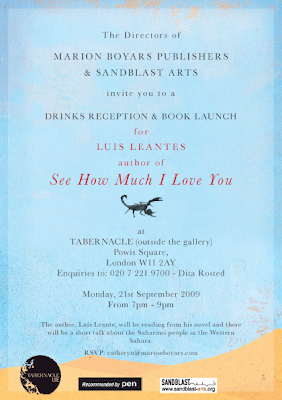My reading of Leante's novel had several reasons, one of them being that my boss suggested it and another that Sandblast's director Danielle Smith contributed the historio-political epilogue to complement the novel.
I spent three quiet days reading this love story. Could barely put it down to spend some precious moments with my family who I visited. Admittedly, it wouldn't have caught my attention if Danielle hadn't suggested it to me. Its title that so readily resembles an addition to the “light romance” section, wouldn't usually have caught my eye.
After having read numerous journal articles and textbooks for a long, LONG time, a novel was a welcome alternative. Especially a novel that drew me into its plot from page one:

"When Montse and Santiago meet as teenagers in 70s Barcelona they have little idea where their summer romance will lead.
After they break up, in spite of Montse's pregnancy, Santiago decides to spend his military service as far away from her as possible: in the Western Sahara, Spain's only African colony. There, he is one of the few Spanish soldiers to befriend the local Sahrawi people, quickly falling in love with their customs and culture. But the year is 1975 and the colony will not last much longer. Following the death of General Franco and the Spanish withdrawal, Santiago becomes caught up in the brutal war between the Sahrawi and invading Moroccan forces. He is entrusted with escorting a Sahrawi friend's family on an epic journey, hundreds of miles across the desert.
Thirty years later, Montse, now a divorced doctor living in Barcelona, sees a photo of Santiago carried by a Sahrawi patient. After discovering that he did not die in 1975 as she had been told and that he, like her, has lost both a child and a partner, she sets out to find him amongst the refugee camps of the Western Sahara, a journey that will prove to be every bit as dangerous as Santiago's so many years before." (Leantes 2009)
There is this. A love story. Between Montse, a young girl with an upper middle-class background whose path is laid out for her, and Santiago, her lover, who doesn't quite know where he belongs, who he belongs to. There is another narrative of a middle-aged doctor now in a Spanish hospital, then in the Sahara struggeling to survive. This unusual dual narrative, jumping back and fro in "then" and "now" every other chapter is slightly confusing. But it's keeping you on your toes. It urges your eyes on, your fingers to turn the pages needing to find out why and how it was and what it develops to.
Most importantly, however, Leantes embeds this love narrative in the complexities of the Western Sahara dispute. He caught the tensions between the Spanish soldiers stationed in the Western Sahara and the Saharawis; the tipping point when the Moroccan military marched into the territory; the epic journey of the Saharawis in an attempt to escape the nearing Moroccans and the napalm bombs. Well said by Gordon Parsons in the first review of "See How Much I Love You" in the Morning Star (July 22, 2009):
“This book exemplifies George Bernard Shaw's contention that it is only through fiction that facts can be made instructive or intelligible, the writer rescuing them from the chaos of their occurrence as he arranges them into a work of art”
Author: Luis Leantes
Title: See How Much I Love You
Publication date: 17 September 2009
256 pages
£9.99







